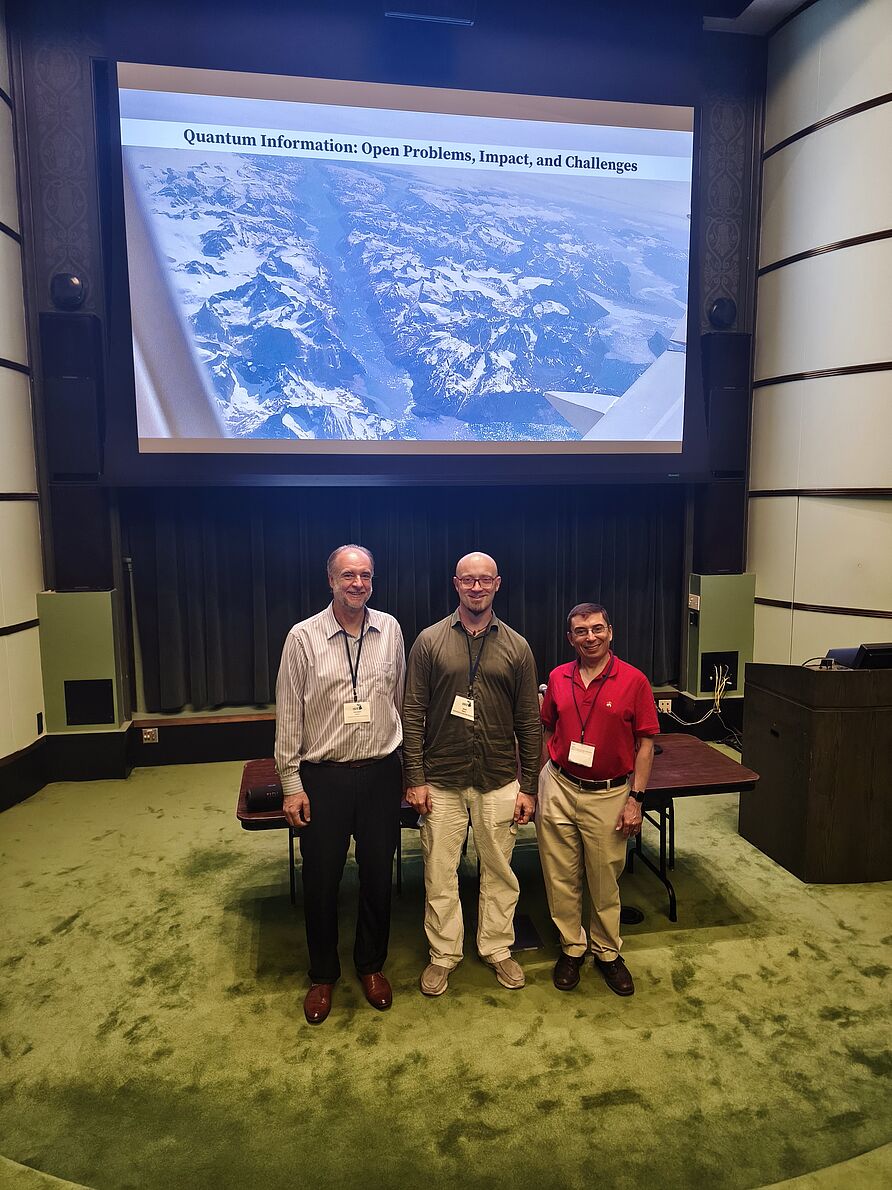The University of Michigan’s historic Rackham Graduate School provided the backdrop today for the 2025 edition of the Q-PIC Workshop—Quantum Information: Open Problems, Impact, and Challenges—held as part of the IEEE International Symposium on Information Theory (ISIT). The workshop was organized by Arun Padakandla (University of Tennessee), Janis Nötzel (TU München), Christian Deppe (TU Braunschweig), and Boulat Bash (University of Arizona), and attracted a diverse audience of quantum physicists, information theorists, and engineers from academia and industry.
The goal of Q-PIC was to examine the latest developments in the rapidly evolving field of quantum information science, a discipline that continues to redefine our understanding of what is possible in computing, communication, and security. Over the past few decades, a series of transformative discoveries has demonstrated that the peculiar behaviors of quantum systems—such as superposition, entanglement, and nonlocality—can be harnessed to achieve processing capabilities far beyond the scope of classical systems. Quantum technologies now stand at the threshold of revolutionizing sectors ranging from secure communication to sensing and beyond.
The workshop opened with an engaging keynote address by Prof. Saikat Guha from the University of Maryland. A leading figure in the field, Prof. Guha provided a panoramic view of quantum information science, outlining both its foundational principles and the major unresolved questions that drive ongoing research. His talk set the tone for the day, emphasizing the interdisciplinary nature of the field and the need for continued collaboration between theorists, experimentalists, and system designers.
Following the keynote, M.Sc. Pau Colomer (Technical University of Munich) presented an in-depth talk on quantum identification, an emerging area that deals with how information can be reliably and securely recognized in a quantum environment. His presentation focused particularly on deterministic identification protocols—offering insight into how these could be realized practically, despite the challenges posed by quantum uncertainty and noise.
A dynamic feature of the workshop was the poster lightning session, in which thirteen selected researchers each delivered a concise 30-second summary of their poster presentations. This fast-paced format gave attendees a quick overview of a wide range of current research topics and prepared them for the in-depth poster session that followed. The session proved to be a highlight of the day, fostering lively discussion and new connections among early-career researchers and senior experts alike.
M.Sc. Nilesh Kumar introduced participants to the concept of Quantum Physical Unclonable Functions (QPUFs). He provided an information-theoretic framework for understanding QPUFs, which are poised to play a critical role in future secure hardware authentication protocols. His work shed light on how quantum randomness and physical uniqueness can be combined to create identifiers that are both robust and impossible to clone.
The afternoon program continued with a series of invited talks showcasing frontier work from both academia and industry. Dr. Gregor Pieplow (Humboldt University of Berlin), a member of the winning team of the German Quantum Communication Grand Challenge, spoke on Secure Quantum Token Processing, discussing practical implementations of secure token-based schemes in quantum systems. His talk highlighted how theoretical concepts are beginning to influence real-world systems.
This was followed by Prof. Robert Calderbank from Duke University, a recipient of the prestigious Shannon Award in 2015. He gave a presentation on Spatially-Coupled Quantum Low-Density Parity-Check (QLDPC) Codes, which are critical to building error-resilient quantum networks. Calderbank’s reputation as a foundational figure in coding theory drew strong interest, and his insights sparked discussions about the feasibility of scalable quantum error correction.
In an intellectually stimulating talk titled "Feynman Meets Turing: Uncomputability of Quantum Gate-Circuit Emulation," Prof. Holger Boche (Technical University of Munich)—recipient of the 2008 Gottfried Wilhelm Leibniz Prize—explored the fundamental limits of algorithmic emulation of quantum gate systems. He offered a theoretical perspective on the boundary between classical and quantum computability, touching on deep connections between physics and the theory of computation.
The workshop also featured a forward-looking industry talk by Dr. Marc Geitz from T-Labs (Deutsche Telekom), who presented a vision for The Quantum Internet. His presentation outlined the architectural and technological milestones required to build a scalable and secure quantum communication infrastructure, including entanglement distribution networks and quantum repeaters.
Dr. Mehdi Namazi, co-founder of Qunnect, a startup based in New York City, shared exciting updates on entanglement distribution in metropolitan environments, with a focus on deployments in New York City. His talk gave participants a glimpse into how quantum technologies are moving beyond laboratory prototypes and into real-world infrastructure.
The workshop concluded with a lively and thought-provoking panel discussion on the challenges facing quantum technologies, bringing together several of the day’s speakers to reflect on what lies ahead. Panelists emphasized the importance of interdisciplinary collaboration, robust theoretical foundations, and public-private partnerships in driving the field forward.
With its strong mix of foundational theory, practical insight, and forward-looking vision, the Q-PIC Workshop 2025 reinforced its reputation as a key forum for dialogue and innovation in quantum information science. As quantum technologies edge closer to practical deployment, events like Q-PIC are playing a vital role in shaping the trajectory of this transformative field.

